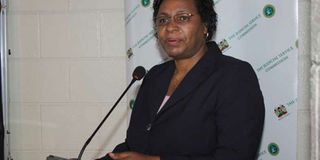PSC to give Uhuru names of candidates for top anti-corruption job

Margaret Kobia, the chairperson of the Public Service Commission and acting chairperson of the Judicial Service Commission, at the Intercontinental Nairobi hotel on August 11, 2016. PHOTO | ANTHONY OMUYA | NATION MEDIA GROUP
What you need to know:
The six candidates from which the PSC picked the final three include retired Anglican Archbishop Eliud Wabukala, William Kipkemboi, a former managing director of the Agricultural Development Corporation, and Philemon Mwaisaka, who served on the defunct Commission for the Implementation of the Constitution.
The others are Peter Bita Ondieki, a former inspector-general of State corporations, Rose Bosibori Osoro, who is on the Commission on Revenue Allocation, and Erastus Iguna Rweria.
According to the EACC Act, the President will have 14 days within which to pick one of the three for appointment as the country’s next anti-graft chief following the unceremonious exit of the
immediate former boss Philip Kinisu who bowed to public pressure to quit in August after a firm associated with his family was cited for involvement in the multi-billion-shilling theft at the National Youth Service (NYS).
Monday is the D-Day for the three shortlisted candidates for the chairmanship of the Ethics and Anti-Corruption Commission (EACC) as the Public Service Commission hands their names to President Uhuru Kenyatta.
PSC chairperson Prof Margaret Kobia told the Nation that the commission had completed the exercise of interviewing and shortlisting the candidates.
“PSC concluded the EACC interviews for the chair on Monday. The commission will deliberate on the performance of the candidates and, based on merit, recommend to the appointing authority three names by next Monday,” Prof Kobia said.
The six candidates from which the PSC picked the final three include retired Anglican Archbishop Eliud Wabukala, William Kipkemboi, a former managing director of the Agricultural Development Corporation, and Philemon Mwaisaka, who served on the defunct Commission for the Implementation of the Constitution.
The others are Peter Bita Ondieki, a former inspector-general of State corporations, Rose Bosibori Osoro, who is on the Commission on Revenue Allocation, and Erastus Iguna Rweria.
According to the EACC Act, the President will have 14 days within which to pick one of the three for appointment as the country’s next anti-graft chief following the unceremonious exit of the immediate former boss Philip Kinisu who bowed to public pressure to quit in August after a firm associated with his family was cited for involvement in the multi-billion-shilling theft at the National Youth Service (NYS).
The process of replacing Mr Kinisu has been dogged by delays after the PSC rejected the first list of all the 68 applicants and re-advertised the position afresh.
TEXT MESSAGE
Two weeks ago, Prof Kobia had sent a short text message to the Nation confirming that the commission had finished interviewing the six finalists and would settle on a shortlist of three to be forwarded to the President for appointment within seven days.
“PSC finished the interviews for EACC Chairperson this evening. All the six candidates turned up for the interview. The commission will within seven days deliberate on the performance of the candidates and recommend three names to the President for consideration for appointment of the chairperson,” she stated in the message sent on November 17, only to change the narrative and state that the interviews for the six were concluded last Monday.
Once the President picks his nominee, the name will be forwarded to the National Assembly which shall, within 21 days, vet and approve or reject the nominee.
It means that the country may not have a new EACC chair until early next year given that the National Assembly is expected to go for the Christmas recess and only resume its sittings after the New Year.
The commission in early October had rejected all the original 68 applicants for the job after failing to get “suitable” candidates.
“On scrutiny of the applications and shortlisting, the commission did not find adequate qualified applicants to proceed to the next stage of interviews,” she was quoted.
The commission was, therefore, forced to re-advertise the position of the chairman, leading to the shortlist of the six finalists.
The delays mirror the confusion surrounding the process of recruiting the new Independent Electoral and Boundaries Commission chairman.





